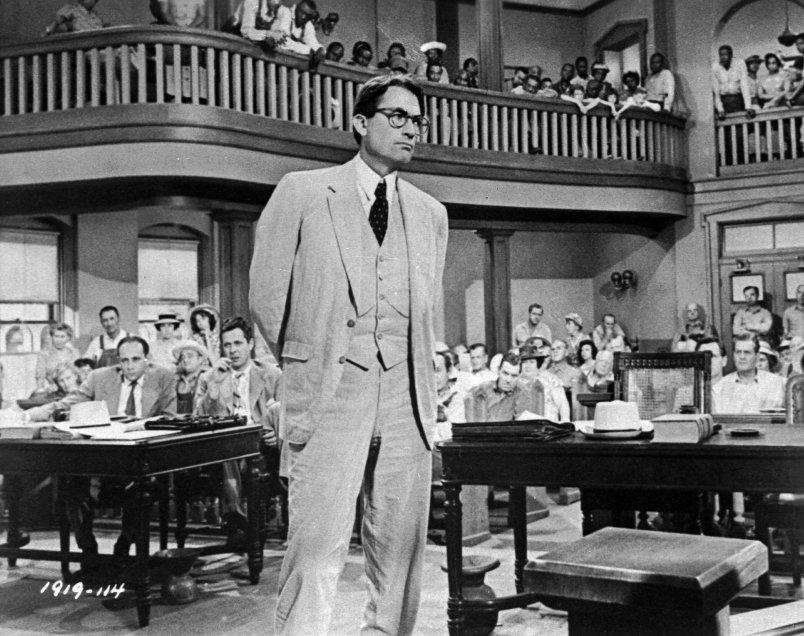NEW YORK (AP) — Harper Lee’s unexpected new novel offers an unexpected and startling take on an American literary saint, Atticus Finch.
“Go Set a Watchman” is set in the 1950s, 20 years after Lee’s celebrated “To Kill a Mockingbird,” and finds Atticus hostile to the growing civil rights movement. In one particularly dramatic encounter with his now-adult daughter, Scout, the upright Alabama lawyer who famously defended a black man in “Mockingbird” condemns the NAACP as opportunists and troublemakers and labels blacks as too “backward” to “share fully in the responsibilities of citizenship.”
“Would you want your state governments run by people who don’t know how to run ’em”? argues the man portrayed by Oscar-winner Gregory Peck in the 1962 film adaptation of “Mockingbird.”
“They’ve made terrific progress in adapting themselves to white ways, but they’re far from it yet.”
“Watchman” was written before “Mockingbird” and is only Lee’s second book, one that Lee’s attorney, Tonja Carter, has said she stumbled upon last year. It will be published Tuesday. The Associated Press purchased an early copy.
Publisher HarperCollins, anticipating concerns that Atticus’ harsh talk will disillusion millions of fans, issued a statement late Friday saying, “The question of Atticus’s racism is one of the most important and critical elements in this novel, and it should be considered in the context of the book’s broader moral themes.”
“‘Go Set a Watchman’ explores racism and changing attitudes in the South during the 1950s in a bold and unflinching way,” the statement reads. “At its heart, it is the coming-of-age story of a young woman who struggles to reconcile the saintly figure of her beloved father with her own more enlightened views. In ‘Go Set a Watchman,’ Scout takes center stage as we witness her anger toward and stand against prejudice and social injustice.”
Rarely has news of a novel been so celebrated and so dreaded since HarperCollins shocked the world in February by announcing that a second Harper Lee novel was coming, an event her fans had long given up on and Lee had often said wouldn’t happen.
HarperCollins has reported that pre-orders for “Watchman” are the highest in company history, and Amazon.com has announced that the novel’s pre-orders are the strongest since the last “Harry Potter” story, which came out in 2007.
But questions have been raised all along about the quality of the book, completed when Lee was a young and unpublished writer and received coolly by publishers, and whether the 89-year-old Lee was fully aware of the planned release.
Alabama officials, responding to at least one complaint of possible elder abuse, even visited with Lee at her nursing home in Monroeville and concluded she was indeed capable of making decisions about the book.
The portrait of Atticus, a supposed liberal revealing crude prejudices, will likely re-energize an old debate about “Mockingbird,” which has long been admired more by whites than by blacks. Winner of the Pulitzer Prize in 1961, and widely praised as a sensitive portrait of racial tension as seen through the eyes of a child in 1930s Alabama, it also has been criticized as sentimental and paternalistic.
In an interview with The Associated Press earlier this year, Nobel laureate Toni Morrison called it a “white savior” narrative, “one of those” that reduced blacks to onlookers in their own struggles for equal rights.
Copyright 2015 The Associated Press. All rights reserved. This material may not be published, broadcast, rewritten or redistributed.







Actually if you can accept that Atticus Finch from “Mockingbird” is a character in literature and that every book is its own little universe, this sounds like an interesting premise. Huckleberry Finch comes to mind—he completely accepted his society’s views on white supremacy, but he refused to act on them anyway, even believing he would go to hell as a result, because of a more powerful inner decency and understanding. I hope I won’t be burned as a heretic for saying it but I think the Mockingbird Atticus is saintly in a way you don’t see all that often in real life, and IMHO he’s far from the most interesting character in the book.
Go Set A Watchman is not the “Mockingbird Sequel.” GSAW was written first. The TKAM story was part of Watchman (a flashback to 20 years before). In GSAW, Jean Louise is trying to reconcile how Atticus could express the views he does, considering her remembrance of Atticus when she was growing up. Taken together, the novels main themes are how children often see their parents differently than an adult sees their parents.
If anyone is interested, the first chapter has been released online
Love Jean Louise’s description of Maycomb: " If you did not want much, there was plenty."
I agree with you, Matt. Atticus could have been a segregationist all along, but, as a lawyer, he was more concerned with a miscarriage of justice. Another interesting thought is this: Would Atticus have believed, and defended, Tom Robinson if Robinson had been accused by a more “upstanding” member of the community? As a member of the Southern upper class, Atticus would have loved down on the “white trash” Ewells as much as the segregationist Atticus would have looked down, paternally, on the blacks.
Could you have worked a 3rd "unexpectantly’ into that first sentence?
Absolutely. The three children keep having to revise their understanding of things over and over again. (OK Dill not so much in the course of the plot but he’s certainly a case of lost innocence.)